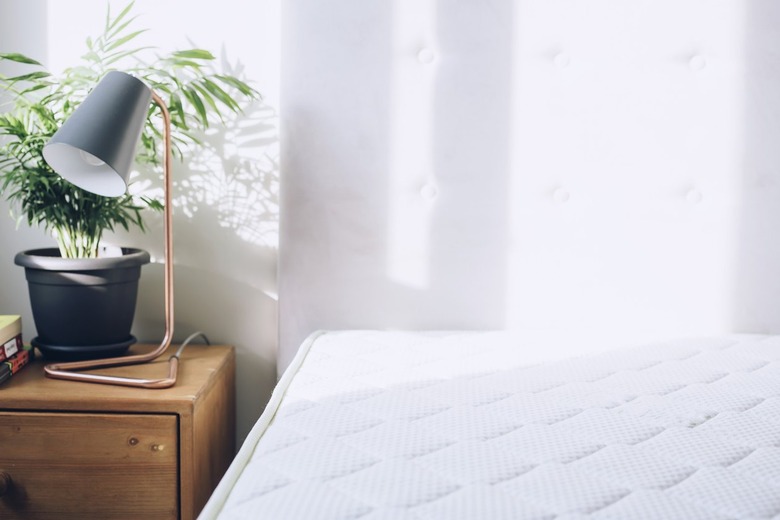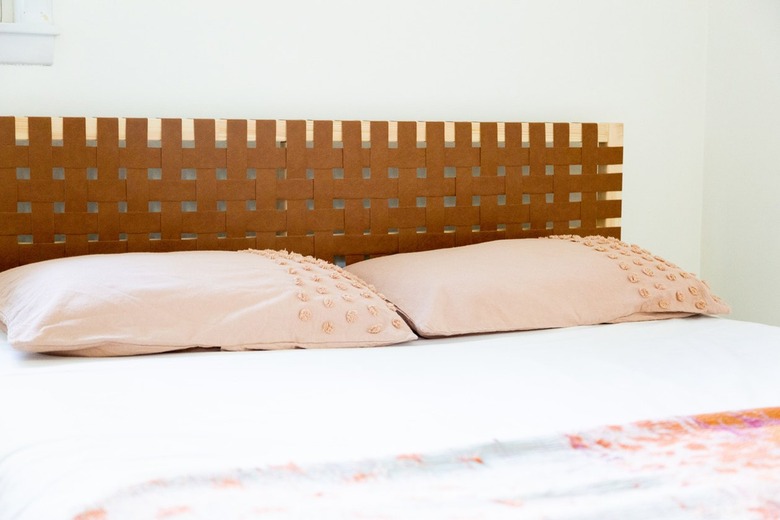According To Experts, Here's How Often You Should Replace Everything You're Sleeping On
Whether you curl up with a cozy duvet, nestle into a top sheet, or sleep underneath a beautifully designed quilt, the truth is that over time, everything we're sleeping on can get dirty and worn out and will eventually need to be replaced.
We hate to be the ones to break it to you, but the details of how gross the items in your bedroom can get are pretty grim: It's estimated that 10 percent of a pillow's weight after two years is dust mites and their excrement, which can make you feel pretty miserable considering that dust mites are among the most common causes of allergies on Earth. Even more bad news? Your mattress is soaked in sweat — approximately 100 liters (or 26 gallons) of it accumulate every year.
But even knowing all that, just how often do we need to be replacing our bed linens and mattresses? We asked cleaning and bedding experts all over the country about how often we need to swap out our sleeping items and for tips on how to keep things fresh so you can catch some nice and clean z's.
How Often to Replace a Mattress
How Often to Replace a Mattress
When to Buy a New One: 7 – 10 years
Many mattress companies tout that you should replace your mattress every seven to 10 years, but this is a pretty wide time frame. So, how do you know when to replace yours? The answer is that it largely depends on the type of mattress you're working with.
"For changing your mattress, you need to find out the type of material it's made of. For example, latex mattresses usually last twice as long as inner spring mattresses, although they're much more expensive, of course," Steve Evans, owner of Memphis Maids, tells Hunker.
Stephen Light, co-owner of Nolah Sleep, confirmed this, telling Hunker, "Depending on the materials used, high-quality mattresses can last up to 10 years. For example, a mattress made of memory foam, hybrid, or latex could last up to 10 years plus. Coil spring mattresses, on the other hand, generally last for about seven years."
Bottom line? Spend more up front for the mattress and it's safe to keep it around for a decade or longer. However, it's good to be aware that seven to 10 years isn't necessarily a magic number, and your mattress could potentially wear out sooner. Signs you should replace a mattress include a heightened sense of allergies and a saggy mattress, according to Light.
How Often to Replace Sheets and Pillowcases
How Often to Replace Sheets and Pillowcases
When to Buy New Ones: 5 years
Sheets and pillowcases can dramatically change the look of a room, so you may already be a fan of switching them out seasonally. But if you've been hanging on to a set you love for a while, you may be wondering when it's time to let them go.
"With proper maintenance and washing, pillowcases and sheets can last up to five years," Lauren Bowen, director of franchise operations for Two Maids & A Mop, tells Hunker. "Pillowcases and sheets can attract dust mites, body oils, dead skin cells, hair, and more, so it's important to wash or change these items every week to prolong the life span of the fabric and keep yourself and your bedroom healthy."
To prevent yourself from making too many trips to the laundry room or laundromat, keep a spare set (or even two) so you can rotate the sheets and pillowcases to keep things fresh and add more longevity to your bedding.
How Often to Replace Pillows
How Often to Replace Pillows
When to Buy New Ones: Every year
Because many of us are focused on what's on top of the mattress (such as cozy comforters and decorative throw pillows), it's not often that we think about replacing a standard pillow — until a guest arrives or we discover a not-so-cute sweat stain. But when do we know whether to just wash and disinfect a pillow or buy a completely new one?
"Pillows are a constant source of bacteria and other microbes. They're constantly in contact with our saliva and face oil when we sleep," Alessandro Gazzo of Emily's Maids tells Hunker. "They should be replaced at least once a year and washed regularly."
Between replacements, it's recommended to wash your pillows once every three months on the hottest setting in your washing machine.
How Often to Replace Duvet Covers and Comforters
How Often to Replace Duvet Covers and Comforters
When to Buy a New One: 2–3 years
Duvet covers and comforters are the stars of your bedroom linens, adding style, comfort, and color to the room. Whether you're team top sheet or team never top sheet, the top layer of your bedding can still be host to spills, stains, sweat, and animal fur over the many nights that you use them. Though you may change your comforter or duvet covers regularly to switch up the look of your bedroom, these linens still have a shelf life.
"Over time, the fibers of sleeping items, like duvet covers, start to break down due to normal wear and tear and also from being washed. As a result, dirt and grime become harder to remove with regular washing, and heavy-duty washing will only erode fibers even more," Diana Rodriguez-Zaba of ServiceMaster in Chicago tells Hunker. "I recommend tossing out sleeping items after two to three years."
Tips on Keeping Everything in Your Bedroom Squeaky Clean
Tips on Keeping Everything in Your Bedroom Squeaky Clean
To add to your mattress and bed linens' life span, it's important to keep a regular cleaning and disinfecting schedule. This will not only extend the life of your items but it will also prevent uncomfortable allergic reactions to dust mites. Vera Peterson, president of Molly Maid, shared with Hunker some of her best tips on how to keep your mattress and linens clean, disinfected, and ready for a peaceful night's sleep:
- Mattress: To extend the life of your mattress, flip and rotate it at least every three months. Beyond that, introduce a deep-cleaning routine with baking soda and a mild detergent to help it reach its 10-year life span potential.
- Sheets/pillowcases: "For sheets and pillowcases, use the hottest water permitted on the label. Hot water means superior disinfection but faster wear and tear. Wash printed and colored pillowcases inside out to preserve the color," Peterson tells Hunker.
- Comforters/duvet covers: Wash comforters and duvet covers individually on the "bulky" setting. If your washer can't handle such a large load, take it to the laundromat or a professional cleaner.




